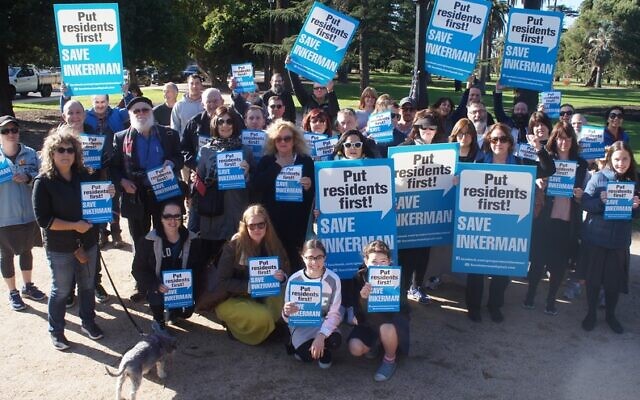Bike corridor ‘an assault on the Jewish community’
“IT would cripple our ability to get a minyan on weekday mornings.” (Zalman Glassner, president of Hamayan)
“Any impediment to access the synagogue, arising from a reduction of proximity car parking could see the end of daily worship services. This would be a disaster for congregants and the community at large, who have been attending prayer services held at Caulfield Hebrew Congregation (CHC) for over 75 years.” (David Mond, president of CHC)
“One can clearly see the parking spots full on Inkerman Street during shule hours. If a bike lane would be introduced, where would everyone park? (Rabbi Yisroel Lebenholc, gabbai at 770 – Chabad House of Caulfield)
As news filtered out last week that Glen Eira Council had revived plans for a “safe cycling corridor” along Inkerman Road and Inkerman Street, alarm bells rang – not just for local residents, who have long been campaigning against the project – but also for the three synagogues along the thoroughfare, who fear the impact the scheme will have on congregants’ ability to attend both services – which may well have to be cancelled if they can’t secure a minyan – and functions.
In the wake of COVID-19, council officials had recommended shelving the cycling path proposal claiming the council simply did not have the money currently to pay for the multimillion-dollar scheme. But that advice was ignored last Tuesday night, with councillors voting five to four to spend upwards of $300,000 on a feasibility study for a project it cannot actually afford.
After a year in which synagogues could barely function, the various shule officials were shocked, particularly given the hardships it would create for certain sections of their membership.
“We are just recovering from the disaster of COVID shut downs of our synagogues and community programs,” lamented Mond. “The bicycle lane proposal will once again lock down among others, our seniors, disabled and parents with prams from accessing the CHC.”
Describing himself as “one of many bike riders in the area who oppose this plan,” Hamayan’s Rabbi Dovid Shmerling concurred. “We have members with young children in pushers to elderly members who require walkers. Easy access is needed to ensure they can observe and celebrate Judaism in safety and without worry. If it’s not straightforward for them to attend, they’ll likely give it a miss.”
Rabbi Lebenholc was equally despondent. “After a rough year affected by COVID, we have finally been fortunate enough to return back to a normal and stable life,” he told The AJN.
“Congregants were eagerly waiting for this moment and have happily settled back to shule, attending three times daily. Once life has resumed again, why bring unnecessary inconvenience and heartache to people?”
But it’s not just the shules that are fearful for the future.
Warren Slabe, manager of the Kimberley Gardens Hotel, a popular destination for interstate and international Jewish visitors, is concerned how extremely large delivery and garbage trucks that already have to perform complex manoeuvres in the road to access the site, will cope.
Add to that the parking Inkerman Street currently offers guests, and he says, “Should any of that be removed, it could potentially have a significant financial impact on the hotel.”
The fears are shared by Shimon Manshari, owner of the Kimberley Gardens Function Centre, which hosts hundreds of guests at weddings, bar mitzvahs and other functions. He predicts “chaos” if the proposal goes ahead, and has no doubt that it will be a blow to his business. “As it is now, it’s difficult for people to park in the area. Imagine what will happen – people won’t be able to park at all. It will have a huge impact.”
The communal concerns echo those expressed by thousands of residents who petitioned against the proposal in 2019 – not only worried generally about loss of personal parking, but specifically parking for the elderly, the disabled and parents with young children. They were also highly fearful of accidents where the bike corridor crossed driveways and junctions.
Such is the level of opposition that state politicians have slammed the proposal including Member for Caulfield David Southwick and Member for Brighton James Newbury, who labelled it “an assault on the Jewish community”.
Councillors David Zyngier, Jim Magee, Neil Pilling, Tony Athanasopolous and Li Zhang, who voted to press on with the bike corridor scheme, were all approached by The AJN to comment on communal concerns, but none responded by press time.
The councillors who voted against proceeding with the initiative were mayor Margaret Esakoff, Simone Zmood, Sam Parasol and Anne-Marie Cade.
Port Phillip Council was due to debate its stance on the bike corridor last night (Wednesday).


comments